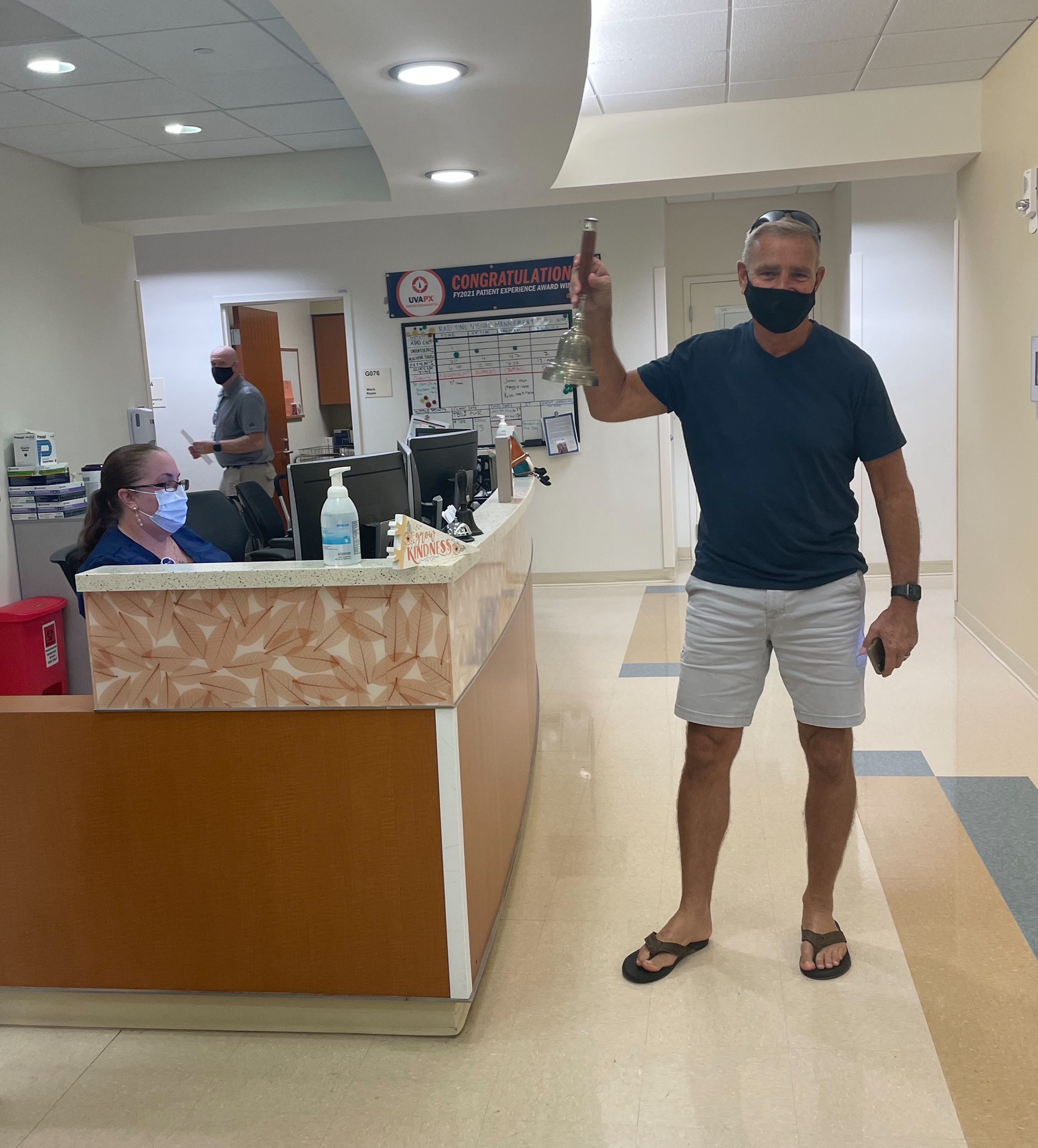
I recently read that the average life expectancy for men has declined to 73 years. That tidbit of trivia has continued to bounce around my brain. If the Social Security mandated retirement age is 67 years of age, then we work for 45 years or so and then live an average of six years in retirement? Ouch. My takeaway is this: we need to take better care of ourselves, so we can stretch those six years into many, many more.
I’m sixty-three. Just over three years ago I went to my doctor for a regular check-up and blood work. I wasn’t too worried about the visit as I was fairly healthy. I exercised as much as I could and tried to eat a nutritious diet. When I’ve had blood work done in the past, everything has come back to normal. This time was different.
The day after the appointment, I received a call from my doctor at 7:30 in the evening. It wasn’t a nurse or an assistant calling; it was my primary care physician. I was filled with a sense of dread.
My doctor told me that my PSA was abnormally elevated and implied prostate cancer. The PSA (Prostate-Specific Antigen) test is a blood test used to measure the level of PSA, a protein produced by the prostate gland. Elevated PSA levels may indicate prostate cancer, but they can also result from benign conditions like prostatitis or an enlarged prostate.
My doctor seemed very worried and had already arranged an appointment for me at the UVA Cancer Center the following week. After numerous CAT scans, PET scans, MRI’s, and a biopsy, the results came back – Stage 4 Prostate Cancer. For more than three years I have battled this disease. My wife and I have made the trip to the UVA Cancer Center more than eighty times.
The sad fact is this: it never should have come to this. Why? I should have caught the cancer long before it progressed to Stage 4. The reason I didn’t catch it was that I had gone more than eight years without having my PSA checked. Between Covid, relocating, and closing down our businesses in Northern Virginia – and any other excuse I could think of – I had not had actual blood work done for all that time. And during those years, the cancer had grown and spread.
Had I caught it earlier, I wouldn’t have had such a battle on my hands. Prostate cancer is slow-growing and easily addressed when caught early. I often wonder what it would have been like had I had the blood work done five or six years ago.
Guys, the odds are pretty good that you are going to get this disease. As a matter of fact, autopsy studies have shown that approximately 30% – 50% of men over age 50 have histological (microscopic) evidence of prostate cancer, even though they were never diagnosed or showed symptoms during their lifetime. That percentage increases with age, reaching 70%-80% in men over 80.
So…. stop reading right now and think about a man that you care about who is over 50 years old. It could be your father, your husband, your brother, your uncle or just a friend. If you truly care about this person, give them this story. What a great gift you might be giving them. The gift of more years with friends and family.
Subscribe for Updates
Sponsors
latest articles
Plan Ahead for a Safe and Sober Holiday Weekend on the Water [Photo Gallery]
![Featured image for “Plan Ahead for a Safe and Sober Holiday Weekend on the Water [Photo Gallery]”](https://lakeanna.online/wp-content/uploads/2025/06/DFW-RIde-Along-8104.jpg)
Fully Community-Funded Rescue Boat Brings Life-Saving Power to the Water

[Sponsored] Holmes on Homes: Business Built on Trust, Grit and Quality
![Featured image for “[Sponsored] Holmes on Homes: Business Built on Trust, Grit and Quality”](https://lakeanna.online/wp-content/uploads/2025/06/FinalHolmes-1.jpg)
Jet Boat Community Celebrates Service and Safety at 2025 Lake Anna Invasion

Best of Lake Anna Corrections & Announcements

Barometric Tides, Explained

I recently read that the average life expectancy for men has declined to 73 years. That tidbit of trivia has continued to bounce around my brain. If the Social Security mandated retirement age is 67 years of age, then we work for 45 years or so and then live an average of six years in retirement? Ouch. My takeaway is this: we need to take better care of ourselves, so we can stretch those six years into many, many more.
I’m sixty-three. Just over three years ago I went to my doctor for a regular check-up and blood work. I wasn’t too worried about the visit as I was fairly healthy. I exercised as much as I could and tried to eat a nutritious diet. When I’ve had blood work done in the past, everything has come back to normal. This time was different.
The day after the appointment, I received a call from my doctor at 7:30 in the evening. It wasn’t a nurse or an assistant calling; it was my primary care physician. I was filled with a sense of dread.
My doctor told me that my PSA was abnormally elevated and implied prostate cancer. The PSA (Prostate-Specific Antigen) test is a blood test used to measure the level of PSA, a protein produced by the prostate gland. Elevated PSA levels may indicate prostate cancer, but they can also result from benign conditions like prostatitis or an enlarged prostate.
My doctor seemed very worried and had already arranged an appointment for me at the UVA Cancer Center the following week. After numerous CAT scans, PET scans, MRI’s, and a biopsy, the results came back – Stage 4 Prostate Cancer. For more than three years I have battled this disease. My wife and I have made the trip to the UVA Cancer Center more than eighty times.
The sad fact is this: it never should have come to this. Why? I should have caught the cancer long before it progressed to Stage 4. The reason I didn’t catch it was that I had gone more than eight years without having my PSA checked. Between Covid, relocating, and closing down our businesses in Northern Virginia – and any other excuse I could think of – I had not had actual blood work done for all that time. And during those years, the cancer had grown and spread.
Had I caught it earlier, I wouldn’t have had such a battle on my hands. Prostate cancer is slow-growing and easily addressed when caught early. I often wonder what it would have been like had I had the blood work done five or six years ago.
Guys, the odds are pretty good that you are going to get this disease. As a matter of fact, autopsy studies have shown that approximately 30% – 50% of men over age 50 have histological (microscopic) evidence of prostate cancer, even though they were never diagnosed or showed symptoms during their lifetime. That percentage increases with age, reaching 70%-80% in men over 80.
So…. stop reading right now and think about a man that you care about who is over 50 years old. It could be your father, your husband, your brother, your uncle or just a friend. If you truly care about this person, give them this story. What a great gift you might be giving them. The gift of more years with friends and family.
Subscribe for Updates
Sponsors
latest articles
Plan Ahead for a Safe and Sober Holiday Weekend on the Water [Photo Gallery]
![Featured image for “Plan Ahead for a Safe and Sober Holiday Weekend on the Water [Photo Gallery]”](https://lakeanna.online/wp-content/uploads/2025/06/DFW-RIde-Along-8104.jpg)
Fully Community-Funded Rescue Boat Brings Life-Saving Power to the Water

[Sponsored] Holmes on Homes: Business Built on Trust, Grit and Quality
![Featured image for “[Sponsored] Holmes on Homes: Business Built on Trust, Grit and Quality”](https://lakeanna.online/wp-content/uploads/2025/06/FinalHolmes-1.jpg)
Jet Boat Community Celebrates Service and Safety at 2025 Lake Anna Invasion

Best of Lake Anna Corrections & Announcements

Barometric Tides, Explained


Belmont Ruritan Clubs Award $26,000 in Scholarships to Local Seniors
Article By Jen Bailey

Exclusive Golf Excursions for Cutalong Members
Article By Jen Bailey







